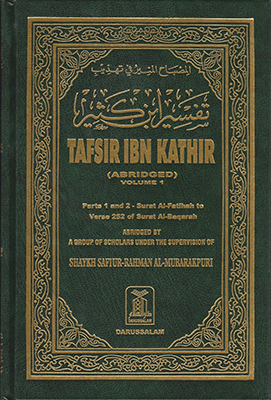

Just a straightforward translation of the text and nothing else.
#Tafseer ibn kathir english pdf full#
There is no prologue or introduction from the editor full of pompous words about the project, none from the translator attempting a biography of the author which cites from non-Muslim authors to support their own opinions. This translation does not distract the reader from the text itself and this is a mark of an honest translation done by a sincere believer.

40 volumes in English, less than 15 in Arabic. Miniature biographies of people named can make the footnote section the dominant portion of the translation as is the case with the academic translation of a-Tabari's world history. But the typical European, orientalist method is to provide a "running commentary" of the commentary. They can be very misleading and the the only true reason to use footnotes is when other authors have been quoted, a citation is acceptable if the work is extant. The devil only seeks the destruction of the Son of Adam due to the vicious enmity and hatred he has always had towards man's father, Adam.The best feature of this translation is that there is no additional commentary from the translator, which is the European style of translation and they don't always have an accurate understanding of the material, or Islam itself for that matter. He also commanded that we seek refuge from the satanic enemy, because the devil does not relent in his enmity if we treat him with kindness and leniency. Allah commanded that we be lenient human enemy, so that his soft nature might make him an ally and a supporter. Verily, He is the Hearing, the Knowing.) (41:34-36) These are the only three Ayat that carry this meaning. And if an evil whisper from Shaytan tries to turn you away (O Muhammad ) (from doing good), then seek refuge in Allah. Paradise and of a high moral character) in this world. But none is granted it except those who are patient ـ and none is granted it except the owner of the great portion (of happiness in the Hereafter, i.e. (Repel (an evil) with one which is better, then verily he with whom there was enmity between you, (will become) as though he was a close friend. When he came back to us we said to him, `You know of a (new) Ruqyah, or did you do this before' He said, `I only used Umm Al-Kitab as Ruqyah.' We said, `Do not do anything further until we ask the Messenger of Allah.' When we went back to Al-Madinah we mentioned what had happened to the Prophet. The chief gave him thirty sheep as a gift and some milk. Is there a healer among you' Then a man whose healing expertise did not interest us stood for her, he read a Ruqyah for him, and he was healed. Some scholars relied on this Hadith as evidence that some Ayat and Surahs have more virtues than others.įurthermore, in the chapter about the virtues of the Qur'an, Al-Bukhari recorded that Abu Sa`id Al-Khudri said, "Once, we were on a journey when a female servant came and said, `The leader of this area has been poisoned and our people are away. The Messenger of Allah came out after he performed his purification and said, (Peace and Allah's mercy be unto you, peace and Allah's mercy be unto you, peace and Allah's mercy be unto you.) He then said, (O `Abdullah bin Jabir! Should I inform you of the best Surah in the Qur'an) I said, `Yes, O Messenger of Allah!' He said, (Read, `All praise be to Allah, the Lord of the existence,' until you finish it.)'' This Hadith has a good chain of narrators. I went to the Masjid and sat there sad and depressed. The Messenger of Allah went while I was following him, until he arrived at his residence.

So I said again, `Peace be unto you, O Messenger of Allah!' Again, he did not answer me, so I said again, `Peace be unto you, O Messenger of Allah!' Still he did not answer me. At-Tirmidhi said that this Hadith is Hasan Gharib.Īlso, Imam Ahmad recorded that Ibn Jabir said, "I went to the Messenger of Allah after he had poured water (for purification) and said, `Peace be unto you, O Messenger of Allah!' He did not answer me. This is the wording reported by An-Nasa'i. It is the seven repeated verses and it is divided into two halves between Allah and His servant.) (Allah has never revealed in the Tawrah or the Injil anything similar to Umm Al-Qur'an.


 0 kommentar(er)
0 kommentar(er)
